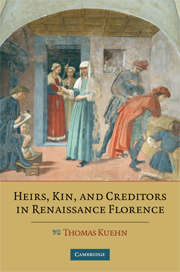Book contents
- Frontmatter
- Contents
- List of Tables
- Preface: The Ambivalence of Inheritance
- Introduction: Of Inheritance and Kinship
- 1 Family and Inheritance
- 2 Florentine Laws Regulating Inheritance and Repudiation
- 3 Repudiation and Inheritance
- 4 Profile of Florentine Repudiation and Inheritance
- 5 Repudiations and Household Wealth
- 6 Repudiation as an Inheritance Practice
- 7 Repudiations in Dispute
- Conclusion
- Appendix 1
- Appendix 2
- Appendix 3
- Appendix 4
- Appendix 5
- Appendix 6
- Sources and Abbreviations
- Index
5 - Repudiations and Household Wealth
Published online by Cambridge University Press: 17 August 2009
- Frontmatter
- Contents
- List of Tables
- Preface: The Ambivalence of Inheritance
- Introduction: Of Inheritance and Kinship
- 1 Family and Inheritance
- 2 Florentine Laws Regulating Inheritance and Repudiation
- 3 Repudiation and Inheritance
- 4 Profile of Florentine Repudiation and Inheritance
- 5 Repudiations and Household Wealth
- 6 Repudiation as an Inheritance Practice
- 7 Repudiations in Dispute
- Conclusion
- Appendix 1
- Appendix 2
- Appendix 3
- Appendix 4
- Appendix 5
- Appendix 6
- Sources and Abbreviations
- Index
Summary
As the legal excuse for repudiation was that an estate was damnosa and not lucrosa, one begins with the presumption that repudiated hereditates were of little real value and riddled with outstanding debts and obligations. Given the nature of the commercial and agricultural economy of Tuscany, in which credit was multiform and ubiquitous, it seems a safe presumption. In a unique account of a repudiation, Maria Serena Mazzi and Sergio Raveggi traced the fate of a contadino whose meager estate was repudiated by his son in 1443. The son moved to Florence and worked in wool shops until succumbing to the plague. This was not a rich family. Their debts were real and assets few.
Still, the statutory record, if nothing else, alerts us to the fact that poverty and misery (and probably in relative, not absolute, terms) were not the only factors at work behind repudiations. There was deliberate maneuvering of property ownership. There were strategies in play. These required resources. The intent was to avoid debts, to be sure, but such strategies were not necessarily linked to misery.
Understanding the uses of repudiation in Florence requires coming to grips with economic factors, insofar as that is possible. Fortunately, Florence's archives provide means to get at the family situations behind repudiation, at least for a representative sample of Florentine citizens.
- Type
- Chapter
- Information
- Heirs, Kin, and Creditors in Renaissance Florence , pp. 136 - 153Publisher: Cambridge University PressPrint publication year: 2008



